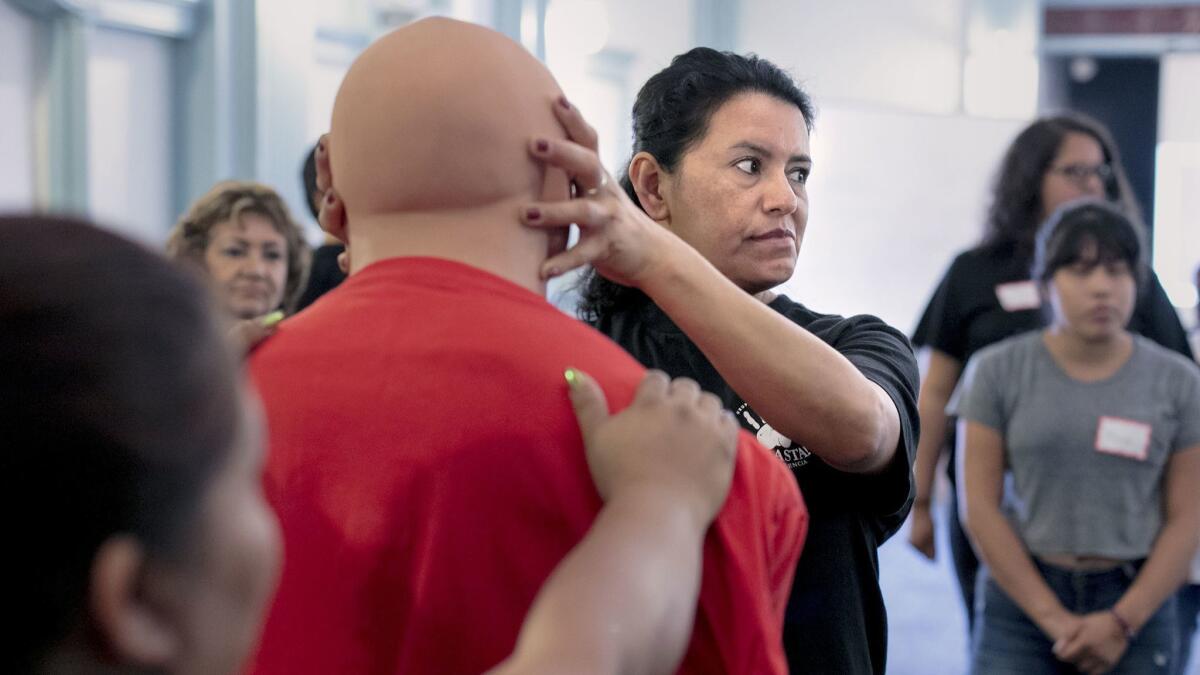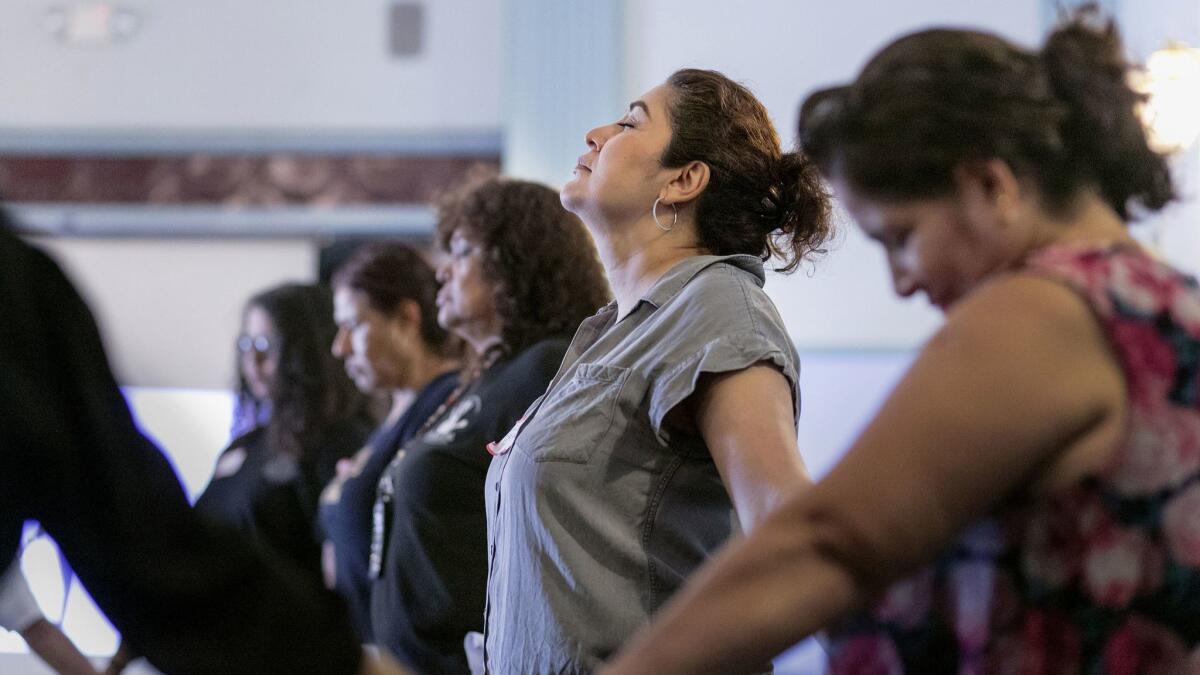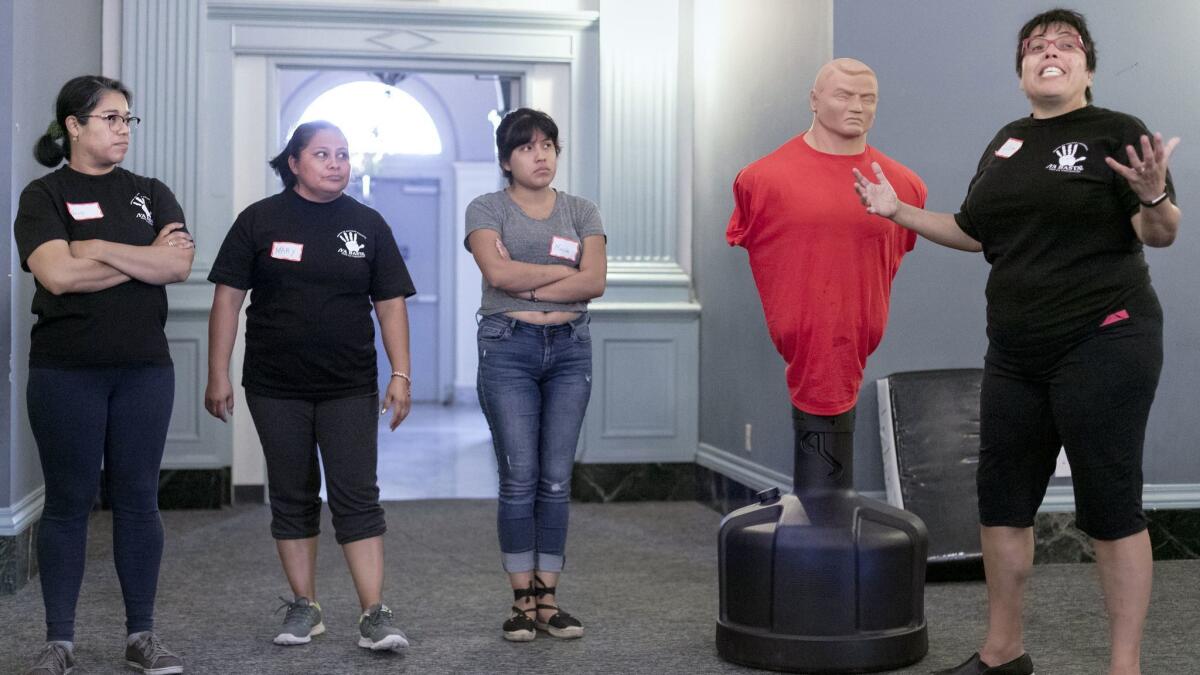Female janitors working the night shift take safety into their own hands

The women planted their bodies and kicked one foot forward, imitating the self-defense move displayed on a projector screen: La patada hacia los testiculos. The kick to the testicles.
Some of the students were sexual assault survivors. Others had dealt with harassment at work. Some were in the country without legal documentation.
With law enforcement nationwide seeing a drop in sexual assault and domestic violence reports by Latinos — some fearing possible deportation — amid President Trump’s immigration crackdown, the Ya Basta self-defense group is filling a void.
“When you look at the #MeToo movement ... they’re not taking on poverty and they’re not taking on immigration. And those are the two main issues that these women face every day,” said Lilia García-Brower, executive director of the Maintenance Cooperation Trust Fund and founder of the group that focuses on training female janitors. Roughly translated, Ya Basta means “Enough is enough.”
“We have to figure out how to bring their voices together and speak explicitly about the abuse of power … and how it plays out in the workplace,” García-Brower said.
Some of the women who help teach the classes, which began in December, said their status in the United States sometimes has felt like an invitation for men who expect that abuse won’t be reported.

Anabella Aguirre fled Guatemala in 2000, leaving three children with her mother, to escape poverty and gang violence. Once in Los Angeles, she worked as a nanny for nearly a year before her cousin helped her apply for a job as a janitor. She told a supervisor about her desperation to make enough money to pay for her children to come to the U.S.
“You make the big mistake of telling them you just got here, you don’t have papers, you have kids,” Aguirre said. “I thought that in sharing my situation, I’ll receive a little help. To the contrary, they use it as a way to abuse us.”
While working a night shift, Aguirre said, she was raped by her supervisor. The next year, she was sexually assaulted at a different work site.
“The threat was: ‘If you want to keep your job, you’re going to keep working under my rules. If not, you’re out of a job … and I can deport you. I have papers, I just have to call immigration, and you’ll go back to your country,’” Aguirre said.
A 2015 “Frontline” report on PBS, ”Rape on the Night Shift,” spotlighted the widespread sexual abuse that female janitors face and led to sweeping changes — including a California law passed a year later that requires janitors and their supervisors to complete sexual harassment training starting next year.
Soon after the PBS investigation, the Service Employees International Union-United Service Workers West asked its members about sexual harassment. Of the more than 5,000 responses, about half said they had experienced sexual violence or harassment.
As a result, Maintenance Cooperation Trust Fund, a statewide watchdog organization that supports non-unionized janitors, and SEIU-USWW partnered with the East L.A. Women’s Center to train women as promotoras, or community educators, committed to ending sexual violence in the industry.
Various organizations formed the Ya Basta Coalition to help meet that goal.
Veronica Lagunas, who emigrated from El Salvador in 2001, received self-defense training last summer. She said the East L.A. Women’s Center opened her eyes to the abuse she has suffered during her 14 years as a janitor.
“You think it’s normal or that you should just let it happen,” Lagunas said.
After Trump took office, the Los Angeles Police Department grappled with a drop in crimes being reported by Latinos. From January to April 2017, there was a decline of more than 23% in sexual assault reports, although the department in a memo this year said there had since been a “significant improvement” in reporting in the Latino community.
“Immigration status is irrelevant when we do our investigations, but we know for sure people are very much afraid of being deported and the repercussions of that,” said Anna Park, regional attorney for the Los Angeles district office of the U.S. Equal Employment Opportunity Commission. “That’s not unique just to this industry, but that fear is heightened.”


On a recent Saturday morning, nearly a dozen women filtered into a drab room in South Los Angeles and sat in a circle around a wooden table. Some brought their daughters.
They meditated for about 20 minutes before García-Brower asked them to think about the root of violence against women — and the mind-set that encourages it.
“That the woman is less, that she can’t defend herself, that she needs to rely on a man,” García-Brower said. “We’re completely opposed to that idea. It’s a lie.”
The instructors, some of them janitors themselves, had the women close their eyes and visualize how many windows were in the room, as well as the color of the walls and the carpet. They asked them to describe the clothing of the woman seated to their right. Many of them could not remember every detail.
It was a way to remind them to be alert.
In a skit, Lagunas pretended to be a supervisor showing employees a pornographic video while the women were on their lunch break.
“This is abuse,” Aguirre, who played one of the employees in the scene, told Lagunas in a firm tone. “This isn’t a place to be watching pornography … I’m going to report you.”
Maria Angeles said that when she started working as a janitor 20 years ago, co-workers would offer rides but expected sexual favors in return. She stuck to the bus, having to walk home alone in the early morning darkness.
“That always happens,” another woman replied. “I had to sacrifice to buy a car.”
The women later moved into a room where they discussed a man’s physical weak spots, including the nose and the testicles. They practiced their self-defense moves on a dummy with a scowling face.
Veronica Orellana struck the target forcefully. The 54-year-old has been a janitor in L.A. for 25 years and continues working the night shift.
In 2005, a foreman who had been harassing her showed up drunk. Orellana said she was taking out the trash in an office just after midnight when he stepped inside and closed the door.
The foreman grabbed her, but Orellana was able to defend herself until co-workers found them and intervened. The company fired him.
Eight years ago, Angeles said, she was forced to physically fight back at work because a co-worker would not stop making sexual remarks to her.
“I get angry knowing how many injustices happen on the night shift,” the 50-year-old said, her voice cracking. “If the buildings could talk, they would tell the stories of every one of us who have suffered.”
brittny.mejia@latimes.com
For more California news, follow @brittny_mejia
More to Read
Start your day right
Sign up for Essential California for news, features and recommendations from the L.A. Times and beyond in your inbox six days a week.
You may occasionally receive promotional content from the Los Angeles Times.







